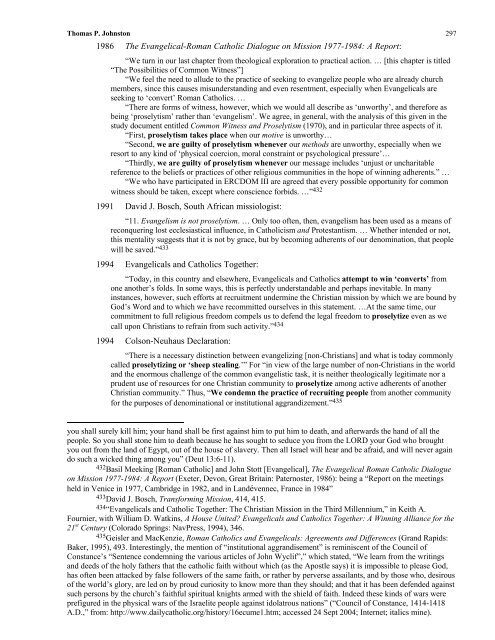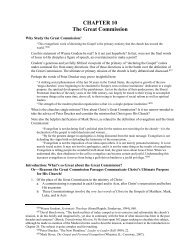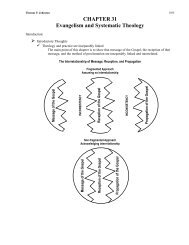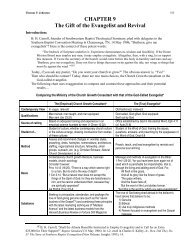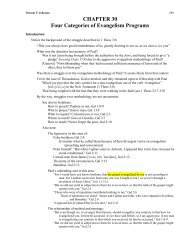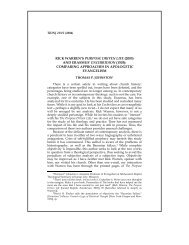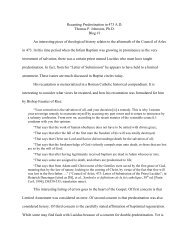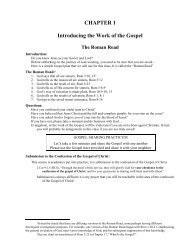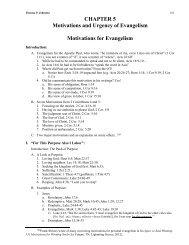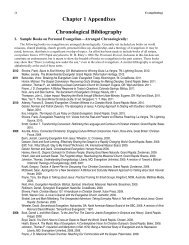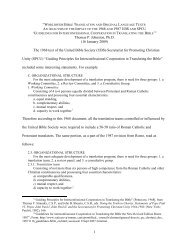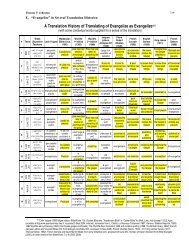CHAPTER 7 Defining Evangelizing - Evangelism Unlimited
CHAPTER 7 Defining Evangelizing - Evangelism Unlimited
CHAPTER 7 Defining Evangelizing - Evangelism Unlimited
You also want an ePaper? Increase the reach of your titles
YUMPU automatically turns print PDFs into web optimized ePapers that Google loves.
Thomas P. Johnston 297<br />
1986 The Evangelical-Roman Catholic Dialogue on Mission 1977-1984: A Report:<br />
“We turn in our last chapter from theological exploration to practical action. … [this chapter is titled<br />
“The Possibilities of Common Witness”]<br />
“We feel the need to allude to the practice of seeking to evangelize people who are already church<br />
members, since this causes misunderstanding and even resentment, especially when Evangelicals are<br />
seeking to ‘convert’ Roman Catholics. …<br />
“There are forms of witness, however, which we would all describe as ‘unworthy’, and therefore as<br />
being ‘proselytism’ rather than ‘evangelism’. We agree, in general, with the analysis of this given in the<br />
study document entitled Common Witness and Proselytism (1970), and in particular three aspects of it.<br />
“First, proselytism takes place when our motive is unworthy…<br />
“Second, we are guilty of proselytism whenever our methods are unworthy, especially when we<br />
resort to any kind of ‘physical coercion, moral constraint or psychological pressure’…<br />
“Thirdly, we are guilty of proselytism whenever our message includes ‘unjust or uncharitable<br />
reference to the beliefs or practices of other religious communities in the hope of winning adherents.” …<br />
“We who have participated in ERCDOM III are agreed that every possible opportunity for common<br />
witness should be taken, except where conscience forbids. …” 432<br />
1991 David J. Bosch, South African missiologist:<br />
“11. <strong>Evangelism</strong> is not proselytism. … Only too often, then, evangelism has been used as a means of<br />
reconquering lost ecclesiastical influence, in Catholicism and Protestantism. … Whether intended or not,<br />
this mentality suggests that it is not by grace, but by becoming adherents of our denomination, that people<br />
will be saved.” 433<br />
1994 Evangelicals and Catholics Together:<br />
“Today, in this country and elsewhere, Evangelicals and Catholics attempt to win ‘converts’ from<br />
one another’s folds. In some ways, this is perfectly understandable and perhaps inevitable. In many<br />
instances, however, such efforts at recruitment undermine the Christian mission by which we are bound by<br />
God’s Word and to which we have recommitted ourselves in this statement. …At the same time, our<br />
commitment to full religious freedom compels us to defend the legal freedom to proselytize even as we<br />
call upon Christians to refrain from such activity.” 434<br />
1994 Colson-Neuhaus Declaration:<br />
“There is a necessary distinction between evangelizing [non-Christians] and what is today commonly<br />
called proselytizing or ‘sheep stealing.’” For “in view of the large number of non-Christians in the world<br />
and the enormous challenge of the common evangelistic task, it is neither theologically legitimate nor a<br />
prudent use of resources for one Christian community to proselytize among active adherents of another<br />
Christian community.” Thus, “We condemn the practice of recruiting people from another community<br />
for the purposes of denominational or institutional aggrandizement.” 435<br />
you shall surely kill him; your hand shall be first against him to put him to death, and afterwards the hand of all the<br />
people. So you shall stone him to death because he has sought to seduce you from the LORD your God who brought<br />
you out from the land of Egypt, out of the house of slavery. Then all Israel will hear and be afraid, and will never again<br />
do such a wicked thing among you” (Deut 13:6-11).<br />
432 Basil Meeking [Roman Catholic] and John Stott [Evangelical], The Evangelical Roman Catholic Dialogue<br />
on Mission 1977-1984: A Report (Exeter, Devon, Great Britain: Paternoster, 1986): being a “Report on the meetings<br />
held in Venice in 1977, Cambridge in 1982, and in Landévennec, France in 1984”<br />
433 David J. Bosch, Transforming Mission, 414, 415.<br />
434 “Evangelicals and Catholic Together: The Christian Mission in the Third Millennium,” in Keith A.<br />
Fournier, with William D. Watkins, A House United? Evangelicals and Catholics Together: A Winning Alliance for the<br />
21 st Century (Colorado Springs: NavPress, 1994), 346.<br />
435 Geisler and MacKenzie, Roman Catholics and Evangelicals: Agreements and Differences (Grand Rapids:<br />
Baker, 1995), 493. Interestingly, the mention of “institutional aggrandisement” is reminiscent of the Council of<br />
Constance’s “Sentence condemning the various articles of John Wyclif”,” which stated, “We learn from the writings<br />
and deeds of the holy fathers that the catholic faith without which (as the Apostle says) it is impossible to please God,<br />
has often been attacked by false followers of the same faith, or rather by perverse assailants, and by those who, desirous<br />
of the world’s glory, are led on by proud curiosity to know more than they should; and that it has been defended against<br />
such persons by the church’s faithful spiritual knights armed with the shield of faith. Indeed these kinds of wars were<br />
prefigured in the physical wars of the Israelite people against idolatrous nations” (“Council of Constance, 1414-1418<br />
A.D.,” from: http://www.dailycatholic.org/history/16ecume1.htm; accessed 24 Sept 2004; Internet; italics mine).


